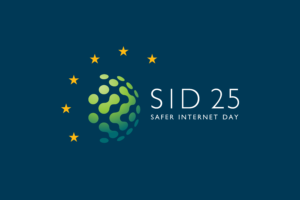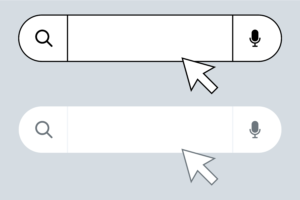
Source: Safer Internet Day
To mark Safer Internet Day, we want to raise awareness of online safety and help you to better protect your digital environment. In an increasingly digitalized world where online security is becoming more and more important, choosing the right browser is a crucial step in protecting yourself from cybercrime and unwanted access. But which browser is the most secure? In this article, we have done some research and provide you with an overview of the most popular browsers and their security features. You can also read our previous article to find out more about internet security.
Ecosia
Ecosia is an environmentally conscious browser based on the Chromium engine, just like Google Chrome. It offers similar security features, including regular updates and protection against phishing. What makes Ecosia special, however, is its business model: instead of maximizing advertising revenue, the browser invests a large part of its profits in reforestation projects and climate protection initiatives.
In terms of data protection, Ecosia respects the privacy of its users and follows a strict data protection policy in which no data is sold or passed on to third parties. This makes Ecosia a sustainable and privacy-friendly choice for environmentally conscious users who also value security.
Google Chrome
Google Chrome is by far the most widely used [9] browser in the world but does not offer the best security and data protection features. It offers solid basic security, which includes regular updates and reliable protection against phishing attacks. Nevertheless, Chrome is often criticized for passing on extensive data to Google. This is controversial from a data protection perspective. Although the browser allows the installation of numerous extensions to improve security, these often require manual installation and additional customization.
Despite its widespread use, Chrome is primarily suitable for users who place less value on maximum data security. Chrome’s performance is also heavily hardware-dependent; good hardware ensures better performance. Overall, Google Chrome remains a popular choice, but users who value data protection and security should also consider other browsers.
Mozilla Firefox
Firefox is often seen as one of the best options for users who prioritize security and privacy [10]. A major advantage of Firefox is its open-source nature, which allows the global developer community to quickly identify and fix security vulnerabilities. This promotes transparency and trust. Particularly noteworthy is the ‘Enhanced Tracking Protection’ mode, which effectively blocks cookies and tracking mechanisms.
This function protects the user’s privacy and minimizes unwanted data tracking on the Internet. Overall, Firefox combines modern security standards with a user-friendly, data protection-orientated architecture.
Tor Browser
The Tor Browser is one of the best options for maximizing anonymity and security on the Internet. It routes Internet traffic via a network of several encrypted servers, known as ‘nodes’, effectively concealing the identity of the user. By default, the browser blocks cookies and scripts, which largely prevents tracking and data collection.
Despite these high security standards, the Tor browser has some disadvantages. In particular, the slow loading times make it less suitable for everyday use. It is also important to note that the Tor browser is often associated with illegal activities, especially in the context of the darknet, where many websites are operated that offer illegal content or services. Many websites on the darknet have an extension that is only accessible via the Tor browser, and some of these sites offer illegal goods and services. In addition, the Tor browser is used by whistleblowers to publish information anonymously. This can lead to users coming across content that they did not originally intend to access. This harbors the risk of encountering dangerous content or offenders. Users should therefore be aware of the potential dangers associated with using the Tor browser.
Safari
Safari, Apple’s default browser, is particularly attractive to macOS and iOS users. Apple attaches great importance to data protection, and Safari is based on the WebKit engine, which offers a smaller attack surface compared to other browser engines. The browser effectively blocks trackers, protects against malicious scripts and thus increases security when surfing. Due to its tight integration into the Apple ecosystem, Safari is a reliable and secure choice for anyone using Apple devices, but not accessible to everyone.
Regardless of the browser you choose, it is important to follow basic security measures: Regular updates, strong passwords, trusted extensions and optimized data protection settings are essential. Mozilla Firefox offers an excellent combination of security, data protection and user-friendliness in comparison. By customizing your browser and security measures to your individual needs, you can ensure a secure and privacy-friendly online experience.
Which Browser Is the Most Secure?

Source: Freepik
Choosing the right browser depends heavily on your individual needs. For maximum security and anonymity, the Tor browser remains unrivalled. However, it is less suitable for everyday use due to slow load times. Alternatives such as Firefox and Safari offer a successful balance between security, privacy and user-friendliness and are therefore recommended for most users. For users who prioritize speed and convenience, Google Chrome can be a solid choice, although the browser has weaknesses when it comes to data protection. Safari and Microsoft Edge are particularly impressive within their respective ecosystems – macOS/iOS and Windows – thanks to a good security base but fall short of alternatives that are specifically geared towards data protection.
Regardless of the browser used, it is important to observe basic security measures: Regular updates, strong passwords, trusted extensions and optimized data protection settings are essential.
Training Programs for More Security
In addition to choosing a secure browser, it is important to regularly inform yourself about current threats and protective measures. SecAware.NRW, an initiative to promote IT security expertise, offers a good opportunity to do this. Here, interested parties can find free further education programs, training courses and materials to better protect themselves and their digital environment
The BSI offers detailed recommendations for the secure configuration of browsers. It is recommended to carry out regular updates, avoid insecure browser extensions and activate security functions such as sandbox technologies. Blocking JavaScript and using integrated phishing protection mechanisms also contribute to security. Further information can be found on the official website of the BSI.
Responsible for the content of this article are Julian Diaconu and Fabio Scheer,
The following sources served as the basis for this article:
– [1] Stat Counter
– [2] PSW Group
– Techradar
– Bitcatcha
– AVG
– Safety Detectives
– Privacy Guides
– BSI
– Computer Bild
– Kinsta
– Nord VPN
– Avast
– Keeper Security





wie ist es möglich Browser nur für private internet-besuche zu konfigurieren und mit welche Browser
Hi Mirko,
danke für deine Frage!
Wenn du einen Browser nur für private Internet-Besuche nutzen möchtest, kannst du dir in den gängigen Browsern wie Firefox, Chrome oder Edge ganz einfach ein eigenes Profil anlegen. Dieses Profil hat dann separate Einstellungen, Lesezeichen und eine eigene Chronik. So bleibt alles klar vom Arbeitsalltag getrennt.
Für gelegentliche private Nutzung kannst du alternativ den privaten bzw. Inkognito-Modus nutzen. Dort werden Verlauf, Cookies und Suchanfragen nicht dauerhaft gespeichert.
Grundsätzlich eignen sich Firefox, Chrome und Edge gleichermaßen gut. Firefox bietet etwas mehr Datenschutz-Optionen, aber alle drei unterstützen getrennte Profile und private Fenster.
Viele Grüße
Dein IT Center Blog Team
Malak,
wer oder was sind ‘Nutzende’???
Ein bisschen Gendergaga???
Hallo Dickel,
der Begriff „Nutzende“ ist eine geschlechtsneutrale Form und Teil der an der RWTH Aachen verwendeten geschlechtergerechten Sprache. Damit möchten wir alle Personen, unabhängig vom Geschlecht, ansprechen und so eine inklusive und respektvolle Kommunikation fördern.
Weitere Informationen zur Umsetzung geschlechtergerechter Sprache an der RWTH findest du in der Handreichung des Gleichstellungsbüros: https://www.rwth-aachen.de/global/show_document.asp?id=aaaaaaaaaaamswi
Viele Grüße
Das IT Center Blog Team
Malak,
wer oder was sind ‘Nutzende’???
Sind Sie vielleicht genderweichgespült???
Ein Grüßende
Wow, was für ein Artikel.
Ich dachte nicht, dass der Blog der RWTH Aachen so ein tiefes Niveau besitzt. Wer sich halbwegs im Thema auskennt, wird sich hier die Haare raufen!
Mir ist klar, dass sich der Blog an den uninformierten Normalbürger richtet, aber trotzdem bleibt der Wissensgehalt auf dem kleinst möglichen Level. Und das bei einer der berühmtesten Universitäten Deutschlands.
Nachfolgend eine Liste mit den vier größten Fehlern meiner Meinung nach:
Erstens fehlt hier die Warnung aus Sicht des Datenschutzes vor Chrome und Edge und nach der Empfehlung der beiden Browsern nach, liegt dem Verfasser nicht viel an seinen Daten. Ich hoffe, dass wenigstens die Beschäftigten der RWTH diese Browser nicht nutzen.
Zweitens gibt es noch andere Browser, die auch besser sind als Chrome und Edge. Ich erinnere nur an Chromium, Brave, Firefox Klar/Focus oder Vivaldi.
Drittens fehlt hier der Hinweis auf Adblocker und Suchmaschinen, die selbst bei Chrome und Edge den Datenschutz erhöhen. Wenn die Menschen schon Datenschleudern nutzen wollen, kann man dadurch die Datenmenge etwas minimieren.
Viertens gibt es auch sehr viel Forschung zu dem Thema Datenschutz. Warum diese nicht in den Artikel einbeziehen? Es gibt sogar Forschung an der RWTH.
Nebenbei solche Sicherheitsinformationen zu vermitteln, ist nicht klug. Wenn die Zeit für eine ordentliche Recherche nicht reicht, dann hat der CISO der RWTH scheinbar nicht viel zu sagen!
Stellen wir uns für einen Moment vor, die BG oder ein Mitarbeiter für Arbeitssicherheit vermittelt Informationen auf diesem Level bei einem Arbeitssicherheitstraining …
Liebe Thomas Schuermeyer,
vielen Dank für das ausführliche Feedback zu unserem Beitrag!
Wir schätzen es sehr, dass du dir die Zeit genommen hast, die Inhalte so gründlich zu reflektieren und deine Einschätzungen mit uns zu teilen.
Du hast vollkommen recht: Datenschutz, die Rolle von Adblockern, alternative Browser und aktuelle Forschung – auch hier an der RWTH – sind wichtige Aspekte, die in einem vertiefenden Artikel unbedingt berücksichtigt werden sollten. Der von uns veröffentlichte Beitrag zum Safer Internet Day sollte bewusst einen niedrigschwelligen Einstieg ins Thema ermöglichen und Personen ansprechen, die bisher wenig Berührung mit IT-Sicherheit hatten.
Deine Hinweise nehmen wir gerne auf, um künftige Beiträge weiter auszubauen und auch stärker in die Tiefe zu gehen. Gerade der Verweis auf Forschungsergebnisse aus der RWTH ist ein wertvoller Punkt, den wir in weiteren Artikeln aufgreifen möchten.
Viele Grüße
Das IT Center Blog Team
Danke für diese Infos!